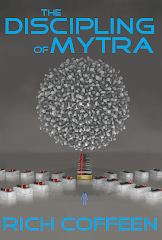The central question of the Christian life is, "Now what? Now that God has forgiven me, what am I supposed to do, be, become, etc.?"
One common answer, "Save as many souls as possible and wait for the Rapture," has proven itself a lie through the fruit of many wasted lives. Surely there must be more to life than getting saved. Otherwise, God's own life is meaningless! (By the way, the typical end-times novel is worse than useless in helping us understand the Christian life.)
The Bible offers many paradigms for answering the question, "Now what?" Essentially the entire account of Abraham recorded in Genesis 12-25 tells the story of his life after he converts. Abraham is saved by faith unto a life of faith; he glorifies God by trusting and waiting on God. If, after believing God, Abraham were asked, "Now what?" it seems his most likely answer would be more of the same: "I am going to keep believing God."
Courtroom to Family Room - Adoption
Another useful paradigm is the relationship between fire and smoke. There is no such thing as a genuine fire that does not produce smoke (no need for quibbles, pure oxygen environment purists). Even so, every person whom God justifies he also sanctifies. There is a necessary causal relationship between the two: those whom God forgives he always changes. In this line of thinking, pursuit of holiness is the essence of the Christian life. We have been called, regenerated, and justified that we might now be conformed unto the image of God's Son. But such spiritual growth must be actively pursued, thereby giving the Christian a great mission in life: to be holy, even as God is holy.
Pilgrim's Progress - Perseverance
Interestingly, all of the above are found on the Ordo Salutis. Faith and Repentance are ongoing actions, not once and done events. We keep believing and repenting every moment of our new life in Christ. Adoption is a once and done legal act, but it places us in a Father-Son relationship that is meant to be continuously experienced and enjoyed. Sanctification and Perseverance are more commonly understood as progressive and ongoing processes in which we are active participants.
Most Christians pick a particular step and focus on it as the organizing principle for their life. This is OK. It is so easy to get distracted; usually it is best to oversimplify what we are trying to accomplish as Christ's followers. So when asked, "Now what?" and one person says, "Holiness, godliness, transformation, new creation," while another person says, "Ongoing trust, rest in Christ's sufficiency, believing in the one he has sent, waiting on the Lord," and so forth, it does not in any way upset me. Each believer has picked the biblical paradigm that "clicks" for him. At least he has a clear goal and vision for his life now that he is justified, which is more than most Christians have.
Besides, if someone pursues any one of these things with great zeal and success, he will end up pursuing all of the others. Pursue holiness long enough, for example, and you end up trusting God, enjoying your relationship with him, bearing fruit in love, courageously fighting off the enemy's attacks, and so forth. Thus, ultimately, each paradigm contains within it every other paradigm. Which is just another way of saying that there is only one answer to the question of now what, only one Christian life that every believer lives. We each simply prefer one Biblical metaphor or another because we each think differently. This is why, of course, that the Bible discusses this one thing (the Christian life) in so many different ways. Use enough variety in communication while aiming at the same core idea, and sooner or later everyone is bound to get it.
Given my general love for the Ordo Salutis as a teaching tool, it is interesting that its combination of steps is not actually my favorite paradigm for understanding the Christian life. I prefer instead to use a typological interpretation of the Exodus.
FROM/UNTO
Through Moses God saves Israelites FROM slavery in Egypt UNTO a life of worship, covenant-keeping, conquest, and dominion.
Through Christ God saves us FROM slavery in sin UNTO a life of worship, covenant-keeping, conquest, and dominion.
I imagine myself having just crossed the Red Sea. The Egyptians' bodies are washing up on shore. I am so amazed and grateful that God has saved me. Yet I am forced to ask the question, "Now what?" And the story provides an answer to this question. God had clear plans and purposes in mind for his people. He did not simply save them out of Egypt, then say, "Go, have a nice life." God has clear plans and purposes for me, as well - and for every person he has brought over from death to life.
I need a comprehensive gospel, one that not only delivers me from the flames of hell but one that restores me to the original purpose for which God made me. Praise God for so complete a salvation!
Saturday, September 12, 2009
Now What?
Subscribe to:
Post Comments (Atom)

No comments:
Post a Comment